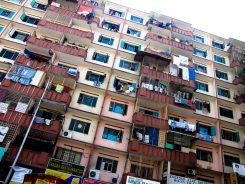[ad_1]
For the poor, the most popular form of safety net support are cash transfers which have gained popularity globally. An unintended consequence of the pandemic, is the widespread adoption of transfers regardless of “need assessment”. Developing country governments have provided cash stimuli free of conditions, moving away from pre-pandemic tradition, when most transfers had certain conditions or a complex set of eligibility criteria attached to them.
This policy development can have another far-reaching consequence. As the developing world plans for economic recovery and restoring social order in a post-COVID era, the current shift in favour of unconditional transfers can pave the way for global adoption of universal basic income (UBI).
To be sure, these unconditional transfers are only emergency measures and temporary; they are not the same as UBI. However, their adoption can be seen as the first necessary step in the right direction and could go a long way in building the much-needed political consensus on UBI.
Conceptually, universal basic income is a minimum subsistence-level sum of cash, paid periodically from the government to its citizens. This payment is without conditions on how it must be spent, and without any eligibility criteria.
UBI approach is relatively new in East Asia. South Korea implemented a modified UBI in April 2020, designated as the Emergency Relief Allowance. Since then, UBI has gained support from lawmakers across the political spectrum, the left as well as the conservatives. China too is actively considering a potential UBI programme. Another notable Asian related example is Thailand’s universal pension program that pays senior citizens on a monthly basis if they are not covered by another formal pension scheme.
Malaysia has implemented a relatively generous COVID-19 stimulus package. Under the PRIHATIN scheme, various cash transfers have been offered to different types of individuals, all strictly within the context of COVID-19. However, this has initially been criticized for excluding certain groups, not surprising given the country’s poor record in social spending. Malaysia lags behind its poorer ASEAN neighbours in social spending which has also marked a steady decline between 2012 and 2020.
This decline is not because there are fewer Malaysians in need of social assistance. If anything, as per the revised poverty line income, Malaysia still has double digit poverty rates in rural regions. As the pandemic ravages the country’s economy for the second year, citizens are questioning the appropriate form of safety net provisions including the demand for UBI.
With the national Parliament being suspended for the first time since 1969, Malaysians have no political platform to reach out to the government to share their concerns and dissatisfaction. However, our analysis of local media content indicates a shift in public demand.
We examined publications of eight leading Malaysian newspapers and portals (New Straits Times, MalaysiaKini, Free Malaysia Today, the Sun daily, The Edge Malaysia, the Star, MalayMail and The Borneo Post) between 2015 and 2020. During this five-year period, we recorded a steady increase in news stories on UBI. However, a noticeable spike occurred in the year 2020, when the unique news items annual count was just under a half of the total count over the preceding study years, indicating a sudden spike in public interest in UBI during the pandemic.
Related

What will it take to address poverty in Malaysia?
Despite Malaysia’s record of economic growth since the 1970s, poverty remains a persistent, and especially vexing, problem. How likely is a structural remedy under the new PH government?
Another notable pattern is the increase in support from lawmakers in favour of UBI in some form – nearly one third of the analysed news stories in 2020 focused on views of politicians from across the political spectrum. This also hints at a growing segment among politicians willing to cross political divides and unite in favour of this policy.
During one Ministers’ Question Time in the Malaysian Parliament in July 2020, prominent opposition leader Nurul Izzah asked the incumbent Minister of Human Resources if there were plans to implement a UBI pilot project. UBI is already being considered under the 12th Malaysia Plan, which was scheduled to be discussed in parliament. However, following the introduction of the state of emergency and suspension of the parliament, MPs have no room to represent the people’s voice and debate policies that are critical to protecting the poor during the pandemic.
In a few years, Malaysia is set to graduate to a high-income nation category. Sharing this new prosperity hinges on an effective social safety net system and adequate provisions to mitigate the burden of poverty in times of crisis. The rich-poor income gap in Malaysia has widened between 2016 and 2019. In the absence of sustained universal income support for the latter, this will worsen further in post-pandemic years.
Globally the pandemic has presented an opportunity to lay the groundwork for new pro-poor reforms. Paradoxically, the government’s own COVID-19 response in some instances have exposed a mismatch between citizens’ expectations and poverty policy formulation. In Malaysia, government social spending is on the decline while policy debates on critical issues such as UBI remain suspended. For an effective safety net system that delivers a shared prosperity vision, listening to citizen’s voices and re-engaging the poor in policymaking on poverty would be a good starting point.
[ad_2]
Source link